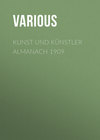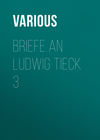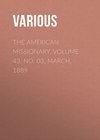Buch lesen: «Mrs. Whittelsey's Magazine for Mothers and Daughters», Seite 22
CHILDREN OF THE PARSONAGE
BY GEORGIANA M. SYKES
Little Charlie, the youngest child of our pastor, was the delight of all the household, but especially of the infirm grand-mother, to whose aid and solace he devoted his little efforts. He was a beautiful and active child, of nearly three years, and was to the parsonage what the father emphatically called him,—its "fountain of joy." But little Charlie was suddenly taken from it, after an illness of a few hours. A week afterward, Fanny, a beautiful and highly intelligent child of five years, died of the same fearful disease, scarlet fever. The following little poems were intended as sketches of the characteristics of the two lovely children.
Some three years after, death bore away also little Emma, a child two years old, who had in some measure replaced the lost children of the parsonage. To express the sparkling and exuberant vivacity of this last darling of friends very dear to the writer, has been the object of another simple lay. There are smitten hearts enough in the homes to which this magazine finds its way to respond to notes that would commemorate the infant dead.
LITTLE CHARLIE
Beside our pilgrim path there sprang
A pleasant little rill,
Whose murmur, ever in our ear,
Was cheerful music still.
The earliest rays of brightening morn,
Back to our eyes it flashed,
And onward through the livelong day,
In tireless sport it dashed.
We loved the little sparkling rill,
We sunned us in its glance;—
The turf looked green where, near our feet,
It kept its joyous dance.
And welcome to our weariness
Was the clear draught it gave;
E'en way-worn age took heart and bowed,
Its aching brow to lave.
But where is now our pleasant rill,
We miss it from our side;
We looked, and it was at its full—
We turned, and it was dried.
Oh Father.—thou whose gracious hand
Bestowed the boon at first,
A parched and desert land is this—
Let not thy servants thirst!
Fountains of joy at thy right hand
Are gushing evermore—
Bid them for us, thy fainting ones,
Their rich abundance pour.
FANNY
We miss thee on the threshold wide.
Smiling little Fanny!
Thine offered hand was wont to guide
Our footsteps to thy mother's side,
Ready little Fanny!
We miss the welcome of thy face,
Winning little Fanny!
We miss thy bright cheek's rounded grace
Thy clear blue eyes' confiding gaze,
Lovely little Fanny!
We miss thy glowing earnestness,
Guileless little Fanny!
We miss thy clasping arms' caress,
The solace of thy tenderness,
Loving little Fanny!
We miss thy haste at school-time bell,
Docile little Fanny!
Learning with eager face to spell,
Thy Sabbath verses conning well,
Studious little Fanny!
We miss thee at the hour of prayer,
Gentle little Fanny!
Thy sweet low voice and thoughtful air,
Reading God's word with earnest care,
Serious little Fanny!
The hour of play brings woeful dearth,
Merry little Fanny!
With thee the voice of childhood's mirth,
Died from about our twilight hearth,
Joyous little Fanny!
But angels' gain doth our loss prove,
Precious little Fanny!
Now dwelleth with our God above3
That little one whose life was love,
Blessed little Fanny!
EMMA
A floweret on the grassy mound
Of buried hopes sprang up;—
Tears fell upon its bursting leaves
And gemmed its opening cup.
But such a rosy sun-light fell
Upon those tear-drops there,
That no bright crystals of the morn
Such diamond-hues might wear.
No glancing wing of summer-bird
Was ever half so gay
As that fair flower—no insect's hues
Shone with such changeful play.
It nodded gaily to the touch
Of every wandering bee,
Its petals tossed in every breeze,
And scattered odors free.
And they who watched the pleasant plant
In its bright bursting bloom,
Hailed in its growth their bower of rest,—
Solace for years to come.
But He who better knew their need
Laid its fair blossoms low;—
Between their souls and heaven's clear light
Tendril nor leaf might grow.
Then oh! how sad the grassy mounds
Its graceful growth had veiled!—
How sere and faded was their life,
Its fragrance all exhaled;—
Till from the blue o'erarching sky,
A clearer beam was given,
A light that showed them labor here,
And promised joy in heaven.
Original
GLEANINGS BY THE WAYSIDE. No. 2
I shall attempt to show by an every-day sort of logic, rather than by any set argument, that young children, when religiously educated, do at a very early age comprehend the being of a God,—that the mind is so constituted that to such prayer is usually an agreeable service,—that in times of sickness or difficulty, or when they have done wrong, they do usually find relief in looking to God for relief and for forgiveness.
I have known quite young children, in a dying state, when their parents have hesitated as to the expediency of referring, in the presence of the child, to the period of dissolution as near, in some paroxysm of distress at once soothed and quieted by the strains of agonizing prayer of the father, that relief might be afforded to the little sufferer, commending it to Jesus.
From my own early experience I cannot but infer that young children do as readily comprehend the sublime doctrine of a superintending providence as the man of gray hairs. We know from reason and revelation that the heavens declare the glory of God, and that the earth showeth forth his handiwork—day unto day utterreth speech, and night unto night showeth forth knowledge of him.
As soon therefore as a child begins to reason and to ask questions, "Who made this?" and "who made that?" it can understand that "the great and good God made heaven and earth." Indeed this truth is so self-evident that the heathen who have not the Bible are said to be without excuse if they do not love and worship the only living and true God, as God.
The man, therefore, of fourscore years, though he may understand all things else,—how to chain the lightning, to analyze all earthly substances, to solve every problem in Euclid, yet in matters of Gospel faith, before he can enter the kingdom of God, must come down to the capacity of a little child, and take all upon trust, and believe, and obey, and acquiesce, simply on the ground, "My Father told me so."
One of the first things I remember with distinctness as having occurred in the nursery, related to the matter of prayer. One night when a sister a year and a half older than myself had, as usual, repeated all our prayers suited to the evening, which had been taught to us, from a sudden impulse I made up a prayer which I thought better expressed my feelings and wants than any which I had repeated. My sister, who was more timid, was quite excited on the occasion. She said that as I did not know how to make up prayers, God would be very angry with me. We agreed to refer the case in the morning to our mother. When we came to repeat our morning prayers, the preceding transaction came to mind, and we hurried as fast as possible to dress, each one eager first to obtain the desired verdict.
Almost breathless with excitement, we stated the affair to mother. Her quick reply was, "The Bible says that Hezekiah, king of Israel, had been sick, and he went upon the house-top, and his noise was as the chattering of a swallow, but the Lord heard him." Without asking any further questions, ever after we both framed prayers for ourselves.
Soon after this occurrence a sudden death occurred in our neighborhood, and my mind was deeply affected. I went stealthily into our spare chamber to offer up prayer, feeling the need of pardon. Just as I knelt by the bedside, my eldest sister opened the door. Seeing her surprise at seeing me there and thus engaged, I was about to rise, when she came up to me, put her arms about my neck, kissed me, and without saying anything, left the room. This tacit approval of my conduct, so delicately manifested, won for her my love and my confidence in her superior wisdom; and though nearly sixty years with all their important changes have intervened, yet that trifling act is still held in grateful remembrance.
One such incident is sufficient to show the immense influence which an elder brother or sister may have, for weal or for woe, over the younger children. The smothered falsehood, the petty theft, the robbing of a bird's-nest, the incipient oath, the first intoxicating draught, the making light of serious things, with the repeated injunction—"Don't tell mother!" may foster in a younger brother the germ of evil propensities, and lead on till some fatal crime is the result.
When I was nine years old a letter was received by my father, the contents of which set us children in an uproar of joy. It was from our father's elder brother, who resided in a city seventy miles distant from our country residence. This letter stated if all was favorable we might expect all his family to become our guests on the following week, our aunt and cousins to remain in our family some length of time, and be subjected to the trial of inoculation from that dreaded disease—small-pox. We were all on tip-toe to welcome our friends, and especially our uncle, who from time to time had supplied us with many rare books, so that we had now quite a valuable library of our own. All our own family of children were at the same time put into the hospital. I shall never forget "O dear," "O dear, I have got the symptoms, I have got the symptoms!" that went around among us children.
I cannot but take occasion to offer a grateful tribute of thankfulness that we are not now required by law, as then, to subject our children to such an ordeal and to such strict regimen. Who ever after entirely recovered from a dread of "hasty pudding and molasses" without salt?
When all was safely over, and my uncle came to take his family home, there seemed to have been added a new tie of affection by this recent intimacy, and it was agreed that my uncle's eldest son, a year or two older than myself, should remain, and for one year recite to my father, and that I should spend that time in my uncle's family, and become the companion of a cousin three years younger, who never had a sister.
I have often wished that such exchanges might be more frequently made by brothers and sisters and intimate friends. It is certainly a cheap and admirable method of securing to each child those kind and faithful attentions which money will not always command. I needed the polish of city life—the freedom and the restraints imposed in well-disciplined schools, where personal graces and accomplishments were considered matters of importance as well as furniture for the mind; while my cousin would be benefited in body and mind by such country rambles, such fishing and hunting excursions, such feats of ball-playing, as "city folks" know but little about. Some fears were expressed lest this boy should lose something by forsaking his well-organized school, and fall behind his classmates. But I have heard that cousin say, as to literary attainments, this year was but the beginning of any high intellectual attainments; for till now he had never learned how to study so that intellectual culture became agreeable to him. And what was gratifying, it was found on his return home that he was far in advance of his classmates. So needful is it often to have the body invigorated, and the mind should receive a right bias, and that such kind of stimulants be applied as my father was able to give to the wakeful, active mind, of his aspiring nephew.
Many times after my return home did my mother bless "sister N–" for the many useful things she had taught me. My highest ambition had been to iron my uncle's large fine white cravats, which, being cut bias, was no easy attainment for a child.
I cannot well describe my astonishment and grief of heart, on being installed in my new and otherwise happy, delightful home, to find wanting a family altar. I had indeed the comfort of knowing that in my own distant home the "absent child" was never for once forgotten, when the dear circle gathered for family worship.
So certain was the belief which my parents entertained that an indispensable portion was to be obtained for each child in going in unto the King of kings, that in case of a mere temporary sickness, if at all consistent, family prayer was had in the room of the invalid. Not even a blessing was invoked at the morning meal till every child was found in the right seat. In case of a delinquency, perhaps not a word of rebuke was uttered, but that silent, patient waiting, was rebuke enough for even the most tardy.
It was felt, I believe, by each member of the family, that there was meaning in the every-day, earnest petition, "May we all be found actually and habitually ready for death, our great and last change." My father did not pray as an old lady is said to have done each day, "that God would bless her descendants as long as grass should grow or water should run." But there was something in his prayers equivalent to this. He did seldom omit to pray that God would bless his children and his children's children to the latest generation.
Oh how often, while absent, did my mind revert to that assembled group at home! Nothing, I believe, serves to bind the hearts of children so closely to their parents and to each other as this taking messages for each other to the court of heaven. Never before did I realize that each brother and sister were to me a second self.
I was a most firm believer in the truth of the Bible, and I have often thought more inclined to take the greater part as literal than most others. I had often read with fear and trembling the passage, "I will pour out my fury upon the heathen, and upon the families that call not upon my name." To dwell in a Christian land and be considered no better than heathen—what a dreadful threatening; a condemnation, however, not above the comprehension of a child. Here I was in such a family, and here I was expected to remain for a full year. I do not recollect to have entertained any fears for my personal safety, yet every time a thunder-storm seemed to rack the earth, and as peal after peal with reverberated shocks were re-echoed from one part of the firmament to the other, I was in dread lest some bolt might be sent in fury upon our dwelling on account of such neglect. Little did these friends know what thoughts were often passing through my mind as I ruminated upon their privileges and their disregard of so plain and positive a duty. I did often long to confide to my aunt, whom I so much venerated, my thoughts and feelings on religious subjects, with the same freedom I had been encouraged to do to my own dear mother. I can never forget the struggle I had on one occasion. A lady came to pass a day in the family. The conversation happened to turn upon the importance and efficacy of prayer. Here now, I thought, is an opportunity I may never have again to express an opinion on a subject I had thought so much about; and summoning to my aid all the resolution I could, I ventured to remark, "the Bible says, 'the effectual and fervent prayer of the righteous prevaileth much.'" I saw a smile pass over the radiant and beautiful countenance of my aunt, and I instantly conjectured that I had misquoted the passage. For a long time, as I had opportunity, I turned over the pages of my Bible, before I could detect my mistake. I cannot say how long a period elapsed, after I left this pleasant family, before the family-altar was erected, but I believe not a very long period. One thing I am grateful to record, that when my aunt died at middle age, all with her was "peace," "peace," "sweet peace." And my venerated uncle recently fell asleep in Jesus, at the advanced age of more than fourscore years, like a shock of corn fully ripe.
INTELLECTUAL POWER OF WOMAN
BY REV. S.W. FISHER
There has been a long-standing dispute respecting the intellectual powers of the two sexes, and the consequent style of education suitable to each. Happily, the truth on this subject may be fully spoken, without obliging me to exalt the father at the expense of the mother, or ennoble man by denying the essential equality of woman. It is among the things settled by experience, that, equal or not equal in talents, woman, the moment she escapes from the despotism of brute force, and is suffered to unfold and exercise her powers in her own legitimate sphere, shares with man the sceptre of influence; and without presuming to wrest from him a visible authority, by the mere force of her gentle nature silently directs that authority, and so rules the world. She may not debate in the senate or preside at the bar—she may not read philosophy in the university or preach in the sanctuary—she may not direct the national councils or lead armies to battle; but there is a style of influence resulting from her peculiar nature which constitutes her power and gives it greatness. As the sexes were designed to fill different positions in the economy of life, it would not be in harmony with the manifestations of divine wisdom in all things else to suppose that the powers of each were not peculiarly fitted for their own appropriate sphere. Woman gains nothing—she always loses when she leaves her own sphere for that of man. When she forsakes the household and the gentler duties of domestic life for the labors of the field, the pulpit, the rostrum, the court-room, she always descends from her own bright station, and invariably fails to ascend that of man. She falls between the two; and the world gazes at her as not exactly a woman, not quite a man, perplexed in what category of natural history to classify her. This remark holds specially true as you ascend from savage to refined society, where the rights and duties of women have been most fully recognized and most accurately defined. Mind is not to be weighed in scales. It must be judged by its uses and its influence. And who that compasses the peculiar purpose of woman's life; who that understands the meaning of those good old Saxon words, mother, sister, wife, daughter; who that estimates aright the duties they involve, the influences they embody in giving character to all of human kind, will hesitate to place her intellect, with its quickness, delicacy and persuasiveness, as high in the scale of power as that of the father, husband and son? If we estimate her mind by its actual power of influence when she is permitted to fill to the best advantage her circle of action, we shall find a capacity for education equal to that of him who, merely in reference to the temporary relations of society, has been constituted her lord. If you look up into yonder firmament with your naked eye, the astronomer will point you to a star which shines down upon you single in rays of pure liquid light. But if you will ascend yon eminence and direct towards it that magnificent instrument which modern science has brought to such perfection of power, the same star will suddenly resolve itself into two beautiful luminaries, equal in brilliancy, equal in all stellar excellence, emitting rays of different and intensely vivid hues, yet so exactly correspondent to each other, and so embracing each other, and so mingling their various colors as to pour upon the unaided vision the pure, sparkling light of a single orb. So is it with man and woman. Created twofold, equal in all human attributes, excellence and influence, different but correspondent, to the eye of Jehovah the harmony of their union in life is perfect, and as one complete being that life streams forth in rays of light and influence upon society.
A LESSON FOR HUSBANDS AND WIVES
The following letter, addressed to a mutual friend, we rescue from oblivion, containing as it does a lesson for husbands and wives, and most gracefully conveyed.
We shall certainly be pardoned if we take a more than ordinary interest to preserve a memento of that "hanging garden," as for months it was as fully seen from our own window as from that of the writer, though a little more remote, yet near enough to feast our eyes, and by its morning fragrance to cause our hearts to render more grateful incense to Him who clothes the lily with such beauty, and gives to the rose its sweet perfume. It is a sad pity that there are not more young wives, who, like the writer of the following letter, are ready to strive by their overflowing love, their gentleness and forbearance, to win their husbands to love and good works.
Perhaps some good divine who may perchance read this article will tell us whether the Apostle Peter, when he said, "For what knowest thou, O wife, whether thou shalt save thy husband?" did not by this language mean to convey the idea of a promise that if the wife did conduct herself towards her husband on strictly Gospel principles, she would be the honored instrument of saving his soul?
"I would like to tell you how my husband and I amuse ourselves, and contrive to have all we want. You will see that we illustrate the old saying, that 'where there is a will, there is a way,' and that some people can do things as well as others. We both love flowers extremely, but we neither own nor control a foot of ground; still, we have this summer cultivated and enjoyed the perpetual bloom of more than a hundred varieties. You will wonder how this is done when you know that we are at board, and our entire apartments consist of a parlor and dormitory—both upon the second floor. Very fortunately our windows open upon a roof which shelters a lower piazza, and this roof we make our balcony. Last May we placed here eight very large pots of rich earth, which we filled with such seeds and plants as suited our fancy. Now, while I sit writing, my windows are shaded with the scarlet runner, morning glory, Madeira and cypress vines, so that I need no other curtains. Then, on a level with my eye, is one mass of pink and green—brilliant verbenas, petimas, roses and oleanders seem really to glow in the morning light. Flowers in the city are more than beautiful, for the language they speak is so different from everything about them. Their lives are so lovely, returning to the culturer such wealth of beauty—and then their odors seem to me instead of voices. Often, when I am reading, and forget for a time my sweet companions, the fragrance of a heliotrope or a jessamine greets me, causing a sense of delight, as if a beautiful voice had whispered to me, or some sweet spirit kissed me. With this presence of beauty and purity around me, I cannot feel loneliness or discontent.
"Our flowers are so near to us we have become really intimate with them. We know all their habits, and every insect that harms them. I love to see the tender tendril of a vine stretch for the string that is fastened at a little distance for its support, and then wind about it so gladly. Every morning it is a new excitement to see long festoons of our green curtains, variegated with trumpet-shaped morning-glories, looking towards the sun, and mingled with them the scarlet star of the cypress vine. When my husband comes home wearied and disgusted with Wall-street, it refreshes his body and soul to look into our "hanging garden," and note new beauties the day has developed. I trust the time and affection we thus spend are not wasted, for I believe the sentiment of Coleridge's lines—
'He prayeth best who loveth best
All things, both great and small
For the dear God who loveth us,
He made and loveth all.'
But there is one circumstance that makes this garden precious, which I have yet to tell you, and you will agree with me that it is the best part of it. When we were married, my husband was in the habit of drinking a glass of beer daily. I did not approve of it, and used to fancy he was apathetic and less agreeable afterwards; but as he was so fond of it, I made up my mind not to disagree upon the subject. Last spring, when we wished some flowers, we hesitated on account of the expense, for we endeavor to be economical, as all young married people should. Then my husband very nobly said that though one glass of beer cost but little, a week's beer amounted to considerable, and he would discontinue the habit, and appropriate the old beer expenditure upon flowers. He has faithfully kept his proposal, and often as we sit by our window, he points to the blooming balcony, saying, 'There is my summer's beer.' The consequence of this sacrifice is that I am a grateful and contented wife; and I do assure you (I being judge) that since beer is turned into flowers, my husband is the most agreeable of mankind.
Yours very truly."




















